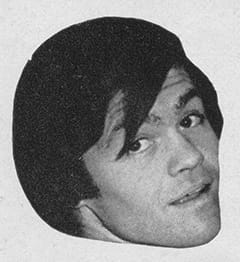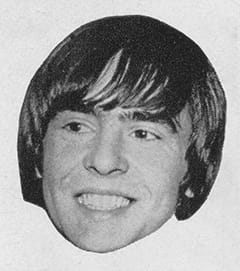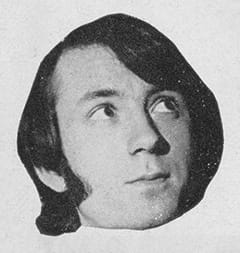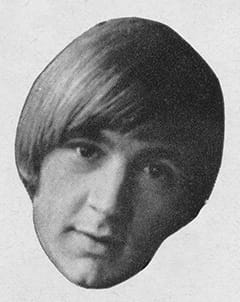Now we must return to Davy. Sorry about all this switching and turning, but it’s VERY difficult to keep up-to-date with the genuine life-stories of four different characters. If we dealt with one at a time, the others would get left out of print for months on end. We’ve annoyed some of you with our chopping-and-changing but your letters prove that most of you like to keep up with all four at the same time.
So back to Davy. Though so tiny, he was a very healthy lad at school. We’ve seen, in an earlier instalment, how he was good at sport and idolised the lads from Manchester United. He was absolutely knocked out when he heard that United had got into the final of the European Cup. One of his heroes is George Best, the 21-year-old Irish International winger of United.
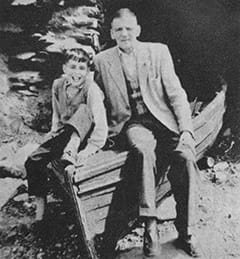
Park-keepers in Debdale Park, which runs right along the back of where Davy used to live in the Gorton area of Manchester, knew Davy as the smallest but loudest of a gang of local schoolkids. In fact they probably gave up a little prayer of thanks when Davy, trying to show off, fell off a wall and had to have four stitches in his tongue. It silenced him very efficiently. But it didn’t stop Davy from pulling grotesque faces… he was VERY good at that.
As we said earlier, he got his musical ability from his mother. All the local kids took part in the Sunday School pantomimes and Davy enjoyed himself no end playing the Genie in a version of “Aladdin”. Nobody took this sort of production very seriously but Davy’s dad was very impressed when he saw his son in a school performance of “Tom Sawyer”. This remains a highlight of Davy’s school years… years when he struggled to keep up with his class-mates and when he created all sorts of “reasons” why he shouldn’t stay in at night and do his homework.
Once he turned up with a strange-looking bulge in his trouser pocket. When the bulge started croaking and moving about, Davy’s father insisted on knowing what it was. IT was a frog! Davy claimed that he understood what the frog was saying and that the frog was sick and needed close attention. And would it be all right if, instead of doing his homework, he took the frog to a nearby pond and gave it some swimming exercises.
Well, it wasn’t all right! Not at all. Davy’s dad had to be very firm with his son, otherwise school work would be forgotten completely. And oddly enough, Davy now says: “I left school eventually at the age of fifteen: I just couldn’t stand any more of it. But now I half wish I’d stayed on longer and taken more notice of what people were trying to instil into my noddle. Still… you can’t kick against what has already happened, can you!”
Gradually, Davy’s dad started thinking about whether his son would make good as an actor. “He had a fine memory—just so long as he was interested in the subject. That part in ‘Tom Sawyer’ was good. I decided that if Davy wanted to try for show business… well, I’d go along with him. There was no point in trying to make him follow me into the engineering side—not if he wanted a job that gave him more chance to show off his personality.”
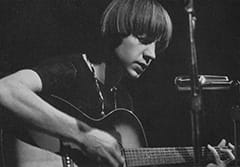
Lots of people think that it’s easy for a kid at school, assuming that he has the talent, to make an early start in radio or television. After all, you’re always seeing kids taking part in plays and films. But, as Davy Jones found out, it’s NOT easy at all.
Because there are authorities whose job it is to make sure that a child’s education is not interfered with. Earlier in this story we pointed out how difficult it was for Micky, as a child actor… he’d do a full day on the set, then have to buckle down to his school books. Same for Davy. At the age of thirteen, he started making a breakthrough in his acting career.
His auntie Hilda wrote on his behalf for one part advertised in “Stage”. But he missed out because… wait for it! he was too small. Too small for radio? Maybe it was just that they couldn’t lower the microphone enough for him! But at thirteen he landed a tiny, two-word-type role in a radio play by Bill Naughton. And then a radio series.
But it meant moving to London for six weeks. And his dad recalls: “We had a tricky job getting permission for him to be away from school all that time. We had to go to the local education authority and promise that we wouldn’t let his work slip and all sorts of things like that.” Still David Jones got his name in the Radio Times, which was one of his most exciting thrills so far… as a performer in things like “There Is A Happy Land” and a series of “Modern Stories”.
A good start? Sure. And yet there was something missing. Davy was a likeable lad, but a bit unpredictable, and he often had rows with the youngsters he worked with. He admits to having cried himself to sleep many nights. He says: “Things didn’t happen fast enough for me. There was so much red tape about doing a show—so much interference. I’d just feel like being by myself sometimes and I started spending afternoons sitting quietly and watching the television. Well, all there was on was horseracing.
“I watched those thoroughbred horses and I thought: how good to work with them. They wouldn’t have goes at me. They’re dumb and loyal and they’ll treat you right if you treat them right.” Gradually this became uppermost in his mind. He saw himself, in his mind’s eye, riding the winner of the Derby or one of the other classics. And after an almighty row with a school teacher he finally came to the conclusion that “horses were much nicer to know than people”.
Well, you already know that he took up the life of apprentice jockey for a while, putting in some time on his acting at the weekends. But at the stables he found that even if the horses WERE nice to know, the bosses worked him very hard indeed.
However that episode of his life, told in his own words, comes in later in the story. To keep the fans of individual Monkees happy, we have to keep on a-ringing the changes… because at this point in time the Monkees had never even heard of each other. They were still four separate characters trying hard to make good, but with no idea what international fame was in store for them. Now it’s been some time since we heard from the tall ’n’ amiable Mike Nesmith, who we last left in college feeling definitely “insecure”. And it was while at college that he met up with his wife-to-be Phyllis, who instantly got rid of most of his feelings of insecurity…
Privacy Permalink
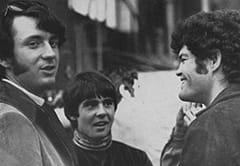
Now Mike respects his privacy—and we respect his right to have that privacy. But he’s told us a little about actually meeting up with Phyllis. He starts like this: “I don’t wanna overdo this lonely bit at school, but it’s true that the girls treated me more as a confidante than as a potential date… “Or there were some and the talk’d go like this: Hi, I’m Mike Nesmith and we met the other day and I wonder if you’d care to come to the movies with me. And this chick would say: no, cos I just don’t like you. I mean, really like that. As blunt as that. I felt, to some extent, like a social outcast.
“And then, suddenly, there was Phyllis. Like I said, I don’t remember things from way back and I’m probably glad in some ways, but I guess Phyllis and I just drifted together. I was no student and I was short on the social graces and I don’t even know how we got talking to each other. But I do know that she was going out with another guy so with my feeling of inferiority I just didn’t do anything else but talk to her.
“Eventually I figured that I’d have to speed things up a bit or I’d be an old man before I got to calling her my steady girl. What I did was out of character. I just upped and asked her to marry me. Heart in mouth, pulse going mad… all the usual feelings. She looked pretty surprised, as I recall. After all, we’d not even been out on a date. So she just said: ‘No’. Like that. Which didn’t put me down as much as it might, on the grounds that chicks had been saying ‘no’ ever since I could remember.”
But Mike changed her mind as you’ll see NEXT MONTH
